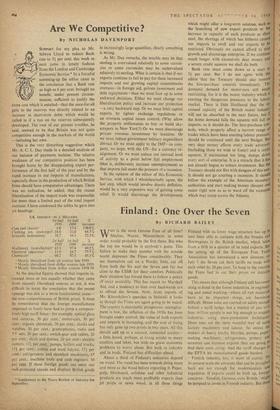Are We Competitive?
By NICHOLAS DAVENPORT
SUPPORT for my plea to Mr. Selwyn Lloyd to reduce Bank rate to 5f per cent. this week or This is the very disturbing suggestion which Mr. A. C. L. Day made in a detailed analysis of our balance of payments malaise. The relative weakness of our competitive position has been brought home by the disappointing export per- formance of the first half of the year and by the rapid increase in our imports of manufactures, especially those in the production of which British firms should have comparative advantages. There was no indication, he added, that the recent liberalisation of the import trade was responsible for more than a limited part of the total import increase. I have condensed the tables he gave into six headings: UK IMPORTS—IN MILLIONS
1st half 1959 1st half 1960 increase
Cars and chassisl .. 6.0
17.4 190.0%
Clothing (ex. stockings)2 18.8
31.0 64.5% Scientific instruments' .. 10.7 16.3 52.3%
1st half /958 1st half /960 increase
Machinery (non-electric)" 65.3 97.4 49.2% Electrical apparatus' .. 13.9 24.7 77.7% Chemicals" .. 60.2 87.5 45.3% Mainly liberalised from all sources late 1959.
2 Mainly liberalised from dollar sources late 1959. 3 Mainly liberalised from dollar sources 1958-59.
As the detailed figures showed that imports in- creased more or less :equally whether they came from recently liberalised sources or not, it was difficult to resist the conclusion that the recent upsurge was due to a more fundamental cause— the non-competitiveness of British prices. It must be remembered that the foreign manufactures imported so freely have had to jump a compara- tively high tariff fence—for example, optical glass and cameras, 50 per cent.; motor-cars, 30 per cent.; organic chemicals, 30 per cent.; clocks and watches, 30 per cent.; gramophones, radio and TV sets, 20 per cent.; switch-gear and cables, 20 per cent.: shirts and dresses, 20 per cent.; electric motors. 171 per cent.; pumps, boilers and trucks, 174 per cent; cotton and wool fabrics, 174 per cent.; refrigerators and electrical machinery, 15 per cent.; machine tools and cash registers, 10 per cent. If these foreign goods can enter our well-protected islands and displace British goods *Supplement to the Times Review of Industry for September. in increasingly large quantities, clearly something is wrong.
As Mr. Day remarks, the trouble may be that sterling is overvalued relatively to some curren- cies or some currencies may be undervalued relatively to sterling. What is certain is that if our exports continue to fail to pay for these increased imports and our growing capital commitments overseas—in foreign aid, private investment and debt repayments—then we must face up to some awkward decisions. Either we must change our liberalisation policy and increase our protection —a very backward step. Or we must limit capital exports by tighter exchange regulations or an overseas capital issues control. (Why allow the property millionaires to buy or build sky- scrapers in New York?) Or we must discourage private overseas investment by taxation. Or we must reduce government military expenditure abroad. Or we must apply to the IMF—in com- pany, we hope, with the US—for a currency re- alignment. Or we must reduce our internal level of activity to a point below full employment (that is, deliberately increase unemployment) so that imports fall under the pressure of a recession.
In the opinion of the editor of this Economic Service, with which I wholeheartedly agree, the last step, which would involve drastic deflation, would be a very expensive way of gaining some relief. It would discourage the developments
as he
eet
ed be op ue which might offer a long-term solution, such the launching of new export products or increase in capacity of such products as sti steel, the shortage of which has hitherto cau our imports to swell and our exports to restricted. Obviously we cannot afford to s growth and discourage enterprise. If we contit much longer with excessively dear money a severe credit squeeze we shall do both.
Bank rate must come down as a start to 51 per cent. But I do not agree with the editor that the Treasury should also rem ve the hire-purchase controls immediately. The domestic demand for motor-cars still needs restraining, for it is the motor industry which is exerting the dangerous pressures in the labour market. There is little likelihood that the in" creased capacity of the British motor indu! trY will not be absorbed in the near future, but if the home demand falls the squeeze will fall on imports, as it should do. The hire-purchase con' trols, which properly affect a narrow range of trades which have been exerting labour pressure. should be continued until the next Budget. But very dear money affects every trade adver! elY (including those we wish to foster) and a credit squeeze, if maintained too long, damps down every sort of enterprise. It is a miracle that it has not already begun to reduce investment. But the Treasury should not flirt with dangers of this sort. It should not go courting a recession. It should follow the example of the American monetary authorities and start making money cheaper and easier right now so as to ward off the recession which may creep across the Atlantic.


































 Previous page
Previous page